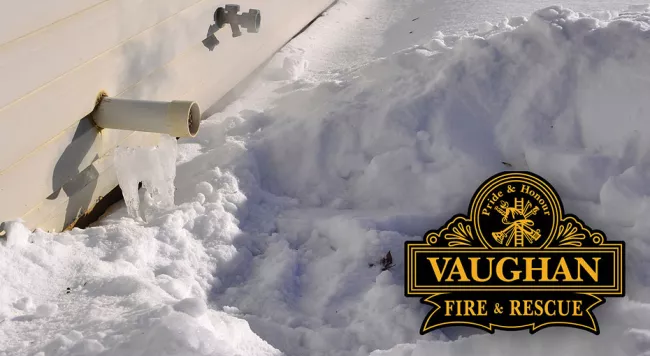Keep your vents and exhaust pipes clear of snow
Vaughan Fire and Rescue Service provides carbon monoxide
safety tips
Following yesterday’s
snowfall, Vaughan Fire and Rescue Service (VFRS) is reminding residents to
ensure their exterior vents and exhaust pipes for the dryer, furnace, stove and
fireplace are clear of snow and ice to prevent carbon monoxide (CO) buildup in
the home – which can be deadly.
Often referred to as the “silent killer,” CO is an
invisible, tasteless and odourless gas that can cause serious illness or death.
The poisonous gas is produced when fuels, such as propane, gasoline, natural
gas, heating oil or wood, do not burn completely in fuel-burning appliances,
such as furnaces, fireplaces, hot water heaters, stoves, barbecues, portable
heaters and generators, or vehicles.
Exposure to CO can cause flu-like symptoms, such as
headaches, nausea and dizziness, burning eyes, confusion, drowsiness and loss
of consciousness. If you or others in your household or building have these
symptoms, go outdoors and call 911 immediately. If your CO alarm sounds and no
one is suffering from symptoms of CO poisoning, check to see if the battery
needs replacing or if the alarm has reached its "end-of-life" before
calling 911.
Here are additional CO safety tips and recommendations from
the National Fire Protection Association:
- If you have been exposed to CO, move to a fresh air location outdoors or by an open window or door. Make sure everyone inside the home or building is accounted for. Call for help from a fresh air location and stay there until emergency personnel arrive.
- If you need to warm a vehicle, remove it from the garage immediately after starting it. Do not run a vehicle or other fueled engine or motor indoors, even if garage doors are open. Make sure the exhaust pipe of a running vehicle is not covered with snow.
- A generator should be used in a well-ventilated location outdoors away from windows, doors and vent openings.
- Only use gas or charcoal grills outside.
For additional information and resources on CO, as well as
fire and life safety issues, visit nfpa.org/public-education. For more fire
safety and prevention tips, visit vaughan.ca/fire.
For updates and news as they happen, subscribe to Vaughan News and follow the
official corporate channels on Twitter, Facebook, Instagram and LinkedIn.

